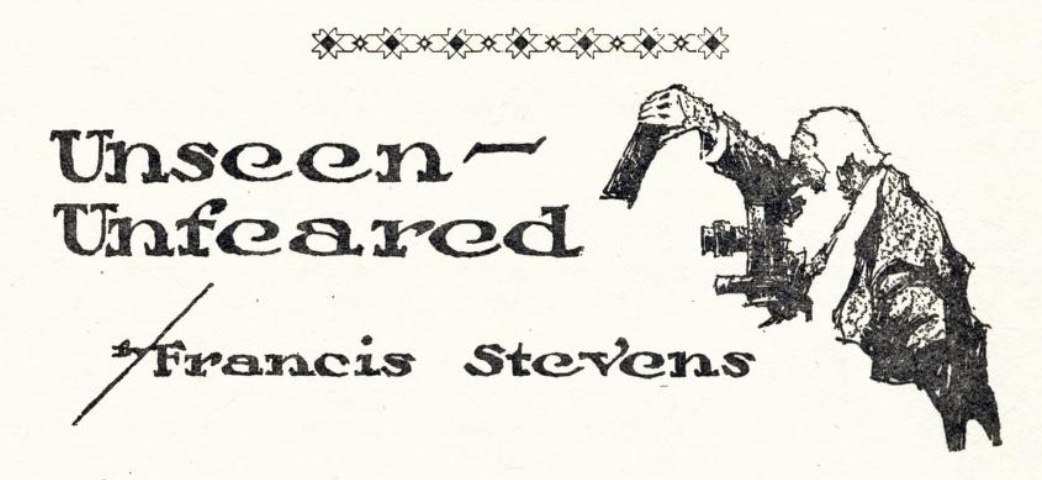UNSEEN — UNFEARED (8)
By:
August 27, 2023

“Unseen — Unfeared” was originally published in the February 10, 1919 edition of People’s Favorite Magazine. HiLoBooks is pleased to serialize it here for HILOBROW’s readers.
ALL INSTALLMENTS: 1 | 2 | 3 | 4 | 5 | 6 | 7 | 8 | 9 | 10.
There was a dull, heavy pain above my eyes. I knew that they were closed, that I was dreaming, and that the rack full of colored bottles which I seemed to see so clearly was no more than a part of the dream. There was some vague but imperative reason why I should rouse myself. I wanted to awaken, and thought that by staring very hard indeed I could dissolve this foolish vision of blue and yellow-brown bottles. But instead of dissolving they grew clearer, more solid and substantial of appearance, until suddenly the rest of my senses rushed to the support of sight, and I became aware that my eyes were open, the bottles were quite real, and that I was sitting in a chair, fallen sideways so that my cheek rested most uncomfortably on the table which held the rack.
I straightened up slowly and with difficulty, groping in my dulled brain for some clew to my presence in this unfamiliar place, this laboratory that was lighted only by the rays of an arc light in the street outside its three large windows. Here I sat, alone, and if the aching of cramped limbs meant anything, here I had sat for more than a little time.
Then, with the painful shock which accompanies awakening to the knowledge of some great catastrophe, came memory. It was this very room, shown by the street lamp’s rays to be empty of life, which I had seen thronged with creatures too loathsome for description. I staggered to my feet, staring fearfully about. There were the glass-doored cases, the bookshelves, the two tables with their burdens, and the long iron sink above which, now only a dark blotch of shadow, hung the lamp from which had emanated that livid, terrifically revealing illumination. Then the experience had been no dream, but a frightful reality. I was alone here now. With callous indifference my strange host had allowed me to remain for hours unconscious, with not the least effort to aid or revive me. Perhaps, hating me so, he had hoped that I would die there.
At first I made no effort to leave the place. Its appearance filled me with reminiscent loathing. I longed to go, but as yet felt too weak and ill for the effort. Both mentally and physically my condition was deplorable, and for the first time I realized that a shock to the mind may react upon the body as vilely as any debauch of self-indulgence.
Quivering in every nerve and muscle, dizzy with headache and nausea, I dropped back into the chair, hoping that before the old man returned I might recover sufficient self-control to escape him. I knew that he hated me, and why. As I waited, sick, miserable, I understood the man. Shuddering, I recalled the loathsome horrors he had shown me. If the mere desires and emotions of mankind were daily carnified in such forms as those, no wonder that he viewed his fellow beings with detestation and longed only to destroy them.
I thought, too, of the cruel, sensuous faces I had seen in the streets outside—seen for the first time, as if a veil had been withdrawn from eyes hitherto blinded by self-delusion. Fatuously trustful as a month-old puppy, I had lived in a grim, evil world, where goodness is a word and crude selfishness the only actuality. Drearily my thoughts drifted back through my own life, its futile purposes, mistakes and activities. All of evil that I knew returned to overwhelm me. Our gropings toward divinity were a sham, a writhing sunward of slime-covered beasts who claimed sunlight as their heritage, but in their hearts preferred the foul and easy depths.
Even now, though I could neither see nor feel them, this room, the entire world, was acrawl with the beings created by our real natures. I recalled the cringing, contemptible fear to which my spirit had so readily yielded, and the faceless Thing to which the emotion had given birth.
Then abruptly, shockingly, I remembered that every moment I was adding to the horde. Since my mind could conceive only repulsive incubi, and since while I lived I must think, feel, and so continue to shape them, was there no way to check so abominable a succession? My eyes fell on the long shelves with their many-colored bottles. In the chemistry of photography there are deadly poisons—I knew that. Now was the time to end it—now! Let him return and find his desire accomplished. One good thing I could do, if one only. I could abolish my monster-creating self.
RADIUM AGE PROTO-SF: “Radium Age” is Josh Glenn’s name for the nascent sf genre’s c. 1900–1935 era, a period which saw the discovery of radioactivity, i.e., the revelation that matter itself is constantly in movement — a fitting metaphor for the first decades of the 20th century, during which old scientific, religious, political, and social certainties were shattered. More info here.
SERIALIZED BY HILOBOOKS: James Parker’s Cocky the Fox | Annalee Newitz’s “The Great Oxygen Race” | Matthew Battles’s “Imago” | & many more original and reissued novels and stories.
